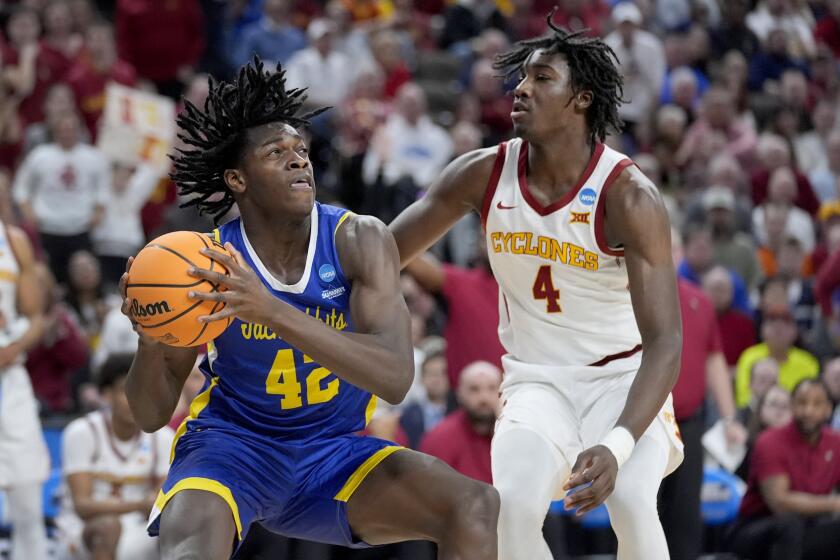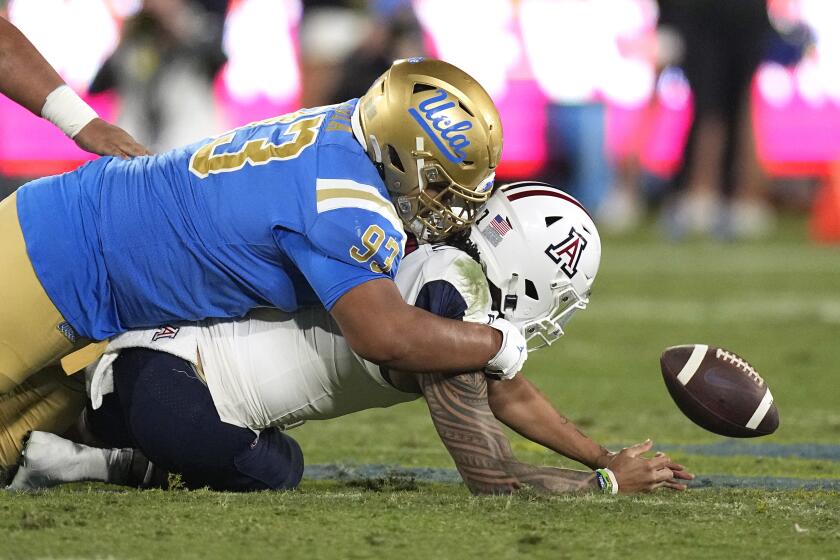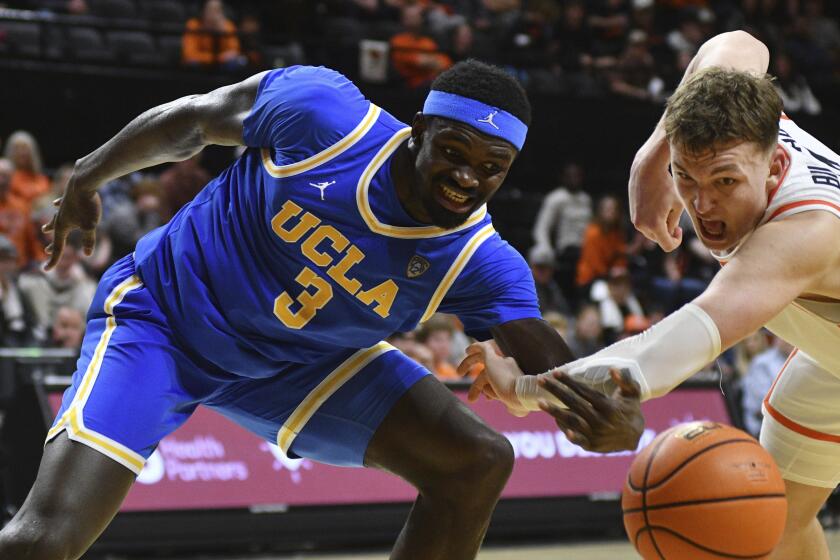A Warsaw Concerto : Polish Coach Babraj Has the UCLA Rowers Back in Fine Tune
Polish-born Zenon Babraj, UCLA’s rowing coach, is one tough cuss.
Babraj, who has coached a previously undistinguished UCLA men’s varsity crew to two Pacific 10 championships, enacted some changes when he was hired in 1986.
A graduate of Warsaw’s Academy of Physical Education, he cleaned up the boathouse and turned off the radio.
“He wouldn’t let us play the radio for a year,” said Ritchie Sax, former UCLA rower. “He thought it was distracting.”
Twentieth-century hardships aside, Babraj--who defected to the United States in 1984--brought a strictness to the Bruin rowing program.
“He turned everything upside down,” said Lee Miller, freshman coach. “It was ‘my way or the highway.’ He started by throwing people off the team. Then he had to teach people to row. Then he had to teach the proper mental attitude.”
Babraj (pronounced bob-rye) is a former Polish national champion with a solid 6-foot, 195-pound build, no-nonsense short hair and piercing brown eyes. His coaching style, at age 34, is to lead by example.
He once challenged the UCLA rowers to a one-on-one competition in any Olympic sport. He had no takers.
He has thrown problem rowers out of the boat and climbed in himself, coaching from the offender’s seat.
He enjoys a spirited political debate, and clings to one Polish tradition: When you open a bottle of vodka with friends, you finish it.
Babraj learned his tough, scrappy ways early.
As a youngster in Warsaw, he came home one day after being beaten up. His father, a man who had spent time in Siberia, asked why he lost, then made it clear that it must not happen again.
Babraj once helped rescue a woman from the ice-covered Vistula River and was declared a hero. The ensuing recognition saved him from being kicked out of engineering school for his nonconformist ways.
He also spent time as a Special Forces officer in the Polish military.
As a young rower, he was a national champion three times--in the straight pair and eight as a junior in 1972, and in the double in 1974 as an elite, with his partner Wieslaw Kujda. Kujda was called to the national team, Babraj was not. But Babraj’s record was good enough to get him into the Academy of Physical Education in Warsaw, which turns down 90% of its applicants.
In 1977, Babraj was graduated at the top of his class. He earned the equivalent of a master’s degree in sport organization and coaching rowing, submitting a thesis entitled “Bilateral Transfer in Motoric Skills for Learning.”
He joined Lech Walesa’s erupting Solidarity movement in 1981 through his club, SKRA, where he coached.
Though Poland was in political upheaval, Babraj said it was an exciting time.
“By the end of 1981, there were 10 million members of Solidarity,” Babraj said. “For the first time, we could organize ourselves and become a democracy.
“It was fun. We could buy forbidden books on the street. There was new information we had never read. We learned that the official history we had been given in school was complete lies.
“After a period of darkness, it (Solidarity) brought some light. And scared some people, I guess.”
Babraj also remembers when martial law brought an end to the movement.
“On December 13, 1981, at 6:30 in the morning, our neighbor knocked on the door,” he recalled. “I looked out the window. There was a tank in front of the apartment building.”
Although Babraj is evasive about the activities that led to his defection, he was an active participant in attempts to pressure the communist regime during the anxious times of 1981. He was arrested.
Now, the only clue to his feelings lies in a toast he offers among his Polish pals: “Na zdrowie. Na pohybel czerwonym.”-- (“For health. For death to Reds.”).
In April of 1984, 29-year-old Babraj left his country, his family, his career and his thesis. A friend smuggled out the thesis later.
He left, he said, for “a thousand reasons and none. I saw the wall, the limit. After the excitement of Solidarity, martial law brought back reality.
“I would have to go back to my double life, play the official game. I would have to be obedient to be a national coach. I could see the end of the channel. I could see my whole life. This didn’t play well with my nature. I decided to take life in my own hands and live it.”
His decision to defect was, he said, actually a relief to his mother, who was fending off the police, and two brothers. His father, who had designed Poland’s Olympic uniforms in 1972, had died in 1976. Babraj said of him: “He was always frustrated with life there. He fought (in World War II) for something else.”
Babraj surrendered his passport in Vienna, requesting political asylum, and spent six months in a refugee camp.
He decided against Australia and Canada, and also rejected several European countries as destinations.
“I could never be Austrian or German or French. I’m Polish,” he said.
When he decided to come to the United States, he also decided that he would not be involved any longer in rowing. He had determined to leave that life behind.
His new life began on Oct. 16, 1984. He flew from Vienna to Auburn, Wash., and the hospitality of a family working with his sponsoring organization, the World Council of Churches.
Soon, his European life was behind him; so was his vow to stop rowing.
Auburn is near the University of Washington, a hub of U.S. rowing. Within two weeks of arrival, Babraj had found the UW boathouse; volunteered to assist the coach, Dick Erickson; found a job cleaning apartment walls; moved closer to the university, and started language and computer classes.
“Everything seemed so exciting, so fresh,” he said of the days with Erickson. “The athletes wanted to do it. They wanted the knowledge.”
Babraj’s big smile and friendly way, Erickson recalled, overcame shortcomings in communication.
“The guys just loved him right away,” Erickson said. “They would come off the water laughing.”
Word spread quickly in the close-knit world of rowing that a new player had arrived. Erickson gave Babraj’s resume to Kris Korzeniowski, national team adviser and also a Polish defector, who offered Babraj the opportunity to coach at national team camps and at the U.S. Olympic Festival.
Babraj spent a short time coaching at the Cincinnati Rowing Club and, at a national team camp in 1985, was spotted by Steve Gladstone, Brown University coach, who hired him as freshman coach. Under Babraj, the freshmen won the intercollegiate championships in the eight and four.
“It was the biggest fun of my life,” Babraj said of his first experience in American college coaching. “These athletes were studying as well as rowing; they had no other reward except winning. In Poland, it’s kind of a job. The atmosphere there is more serious.”
In the meantime, UCLA’s rowing program was faltering. As a high-tech, expensive, low-profile, non-revenue and non-NCAA sport, it was going to be dropped.
“The UCLA Athletic Department had decided to drop rowing,” said Julian Wolf, a Bruin rowing booster. “In 1985, they gave us three years and reduced the budget by one-half. They figured we were going to roll over and die, but we refused to do it.”
Wolf was charged with finding a coach who could shake up the program. Babraj’s name emerged, the UCLA job was offered, and Babraj accepted.
“We didn’t tell him the precarious position we were in,” Wolf said. “He claims he didn’t know. It was the best thing we could have done.”
Babraj has not only resurrected the UCLA rowing program, which had several years of glory as undefeated West Coast champions in 1967 and champions again in 1970, he has positioned UCLA as a national contender, with the two West Coast championships and national finishes of fourth (1987) and sixth (1988) place.
He has also updated the boats, selling most of the old ones and building a new fleet. That is not an easy task, because a new eight costs from $10,500 to $15,000 (domestic Schoenbrod or Vespoli), to $25,000 (West German Empacher, delivered). UCLA has no Empacher eight. The boats are usually donated or leased.
Friends of UCLA Rowing (FOUR), under its president, Kevin Sherwood, is scrambling to keep the program financially healthy in the face of shrinking university support. To keep the boathouse, equipment, a full-time rigger and men’s and women’s coaches afloat will cost $244,000 this year. UCLA is providing $96,000 of that sum; next year, UCLA’s support may drop to $51,000 or less.
Dr. Judith Holland, senior associate athletic director in charge of 16 of the 23 intercollegiate sports at UCLA, said: “If we had unlimited resources, a money well in the back yard, we would never have gotten into this discussion. I have to balance the budget. We give to every sport according to its needs.
“There was a move four years ago to assign rowing to club status. We worked out reduced funding (instead). The department gave $75,000 (per year) to FOUR; they made up the rest.”
An athletic department committee, she said, decided recently to fund the “core costs” of the rowing program up to $35,000 a year--the boathouse, rent, insurance--as if it were a club or a teaching program.
“They (FOUR) fund everything beyond that,” Holland said.
The “beyond that” portion includes coaches’ salaries.
Said Sherwood: “I’m scared to death I won’t be able to pay him. That’s why we’re so vulnerable to Cal or the USRA (United States Rowing Assn.) or any university that wants to take him away. The University should take the responsibility and say ‘yes, we want crew.’ We can bring in prestige. The problem is, rowing is not NCAA, and they don’t get another championship to put on their letterhead.”
Although funding is a problem, the real source of irritation seems to be a basic need for a recognition from the athletic department. Disgruntled alumni say that the department has not acknowledged the Pac-10 championships with so much as a “Thanks, Zen,” although a secretary did call up and ask for the trophy.
Babraj himself said he doesn’t have any problem with the department. As far as support services, he said, “The help is there.”
In addition to other universities who may be seeking Babraj’s services, the USRA is seeking a national sculling coach for its designated training center in Newport Beach. The USRA is advertising the position.
The UCLA rowing community fantasizes over the thought of what could be, with Babraj at the helm. Wolf sees a national championship on the horizon. Sherwood sees Olympic medals at the Marina del Rey boathouse, and UCLA as a regional training center in cooperation with the USRA.
But for now, that remains only a dream.
The shell is made of carbon fiber or wood and is between 57 feet and 60 feet long. The race for this type of boat is 2,000 meters or 1.24 miles, which can be navigated in less than six minutes.
The crew, consisting of eight rowers and a coxswain, are shown by seat.
UCLA VARSITY 8 CREW No. 1 (Bow)--Brad Marquardt, 19, Seattle (Garfield), sophomore, rows on the starboard side. He also rowed for three years in high school.
No. 2--Stefanos Volianitis, 22, Athens, Greece, junior, kinesiology major. He rows on the port side. This is his third year of varsity. He previously rowed in Greece.
No. 3--Simon Outhwaite, 22, Santa Ana, senior, psychobiology and pre-med major. He rows starboard. This is his first year on varsity.
No. 4--Teo Bielefeld, 23, Santa Fe, N.M., senior, art major. He rows port. This is his third year on varsity. He transferred from Orange Coast College. He is a national team candidate.
No. 5--Mike Stralka, 22, Riverside Poly, senior, history major. He is the best starboard rower. He has been in the same seat for three seasons. He was inspired to start rowing by watching the Olympic regatta.
No. 6--Eric Kowal, 21, Eagle Rock, senior, economics major. He rows on the port side. This is his first year in varsity boat for regular season. He stroked the junior varsity boat to a 1988 bronze in Pacific Coast championships.
No. 7--Marc Batchelder, 21, Palos Verdes Rolling Hills, senior, political science major. He rows on the starboard side and last season was in the bow seat. He was moved into the No. 7 seat to help with the rhythm.
No. 8 (Stroke)--Mike Farrell, 21, Northridge Chaminade, senior, art history major. He rows on the port side. He was in the No. 4 seat in 1986 and the No. 2 seat in 1987.
Coxswain--Dave Watt, 21, Berkeley, senior, political science major. This is his first year in varsity and seventh year as a coxswain. His mother is also a coxswain.
Go beyond the scoreboard
Get the latest on L.A.'s teams in the daily Sports Report newsletter.
You may occasionally receive promotional content from the Los Angeles Times.



